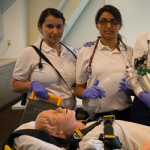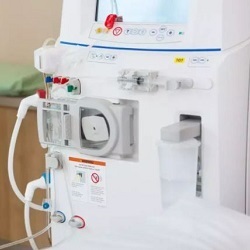What is a Dialysis Technician?
With a career as a Dialysis Technician, you can expect to work in hospitals or dialysis clinics helping patients with their kidney disease issues.
Not only will you help administer the dialysis treatments, but you will also monitor the treatments, making adjustments if needed, and assure that all patients are well taken care of.
This career requires the Dialysis Technician to have medical knowledge, however, it’s not required to seek formal education in this career.
Those who do earn an Associate’s degree or a certificate often find better employment opportunities.
Duties
Along with assisting patients during their dialysis treatment, there are several required duties for a Dialysis Technician, including:
- Assembling supplies and preparing machinery
- Testing monitors and machine function
- Taking patient vitals
- Measuring and calculating blood flow
- Disinfecting and sanitizing equipment
- Communicating with patients
- Providing emotional and psychosocial care to patients
- Responding to alarms, adjusting equipment
Salary
Having a career as a Dialysis Technician can be an easy way to get started in the medical field.
On average, a Dialysis Technician makes around $57,800 a year in the United States.
After several years of experience, as well as certifications, it’s possible to make over $79,340 a year as a Dialysis Technician.
Don’t expect to make this salary right out of the gate, as new Dialysis Technicians make closer to $30,280 a year to begin.
Salary is usually higher for those who work in larger populations.
For example, California pays its Dialysis Technicians $62,000 a year on average.
However, in Indiana, a Dialysis Technician only makes about $42,000 a year.
Annually National Average Salary: $56,910
Average Annual Salary by State
| State | Avg. Annual Salary |
|---|---|
| Alabama | $46,170 |
| Alaska | $61,980 |
| Arizona | $51,070 |
| Arkansas | $45,720 |
| California | $68,450 |
| Colorado | $60,900 |
| Connecticut | $70,220 |
| Delaware | $63,170 |
| District of Columbia | $65,950 |
| Florida | $52,280 |
| Georgia | $53,010 |
| Hawaii | $62,520 |
| Idaho | $48,120 |
| Illinois | $55,190 |
| Indiana | $49,720 |
| Iowa | $52,490 |
| Kansas | $53,020 |
| Kentucky | $54,350 |
| Louisiana | $53,180 |
| Maine | $58,390 |
| Maryland | $58,180 |
| Massachusetts | $60,980 |
| Michigan | $53,230 |
| Minnesota | $58,880 |
| Mississippi | $45,430 |
| Missouri | $50,260 |
| Montana | $57,580 |
| Nebraska | $52,620 |
| Nevada | $59,970 |
| New Hampshire | $66,930 |
| New Jersey | $65,860 |
| New Mexico | $48,200 |
| New York | $72,500 |
| North Carolina | $52,690 |
| North Dakota | $55,580 |
| Ohio | $56,170 |
| Oklahoma | $48,480 |
| Oregon | $69,330 |
| Pennsylvania | $56,080 |
| Rhode Island | $70,580 |
| South Carolina | $51,370 |
| South Dakota | $50,790 |
| Tennessee | $54,770 |
| Texas | $53,240 |
| Utah | $50,540 |
| Vermont | $59,180 |
| Virginia | $55,220 |
| Washington | $64,100 |
| West Virginia | $53,900 |
| Wisconsin | $54,660 |
| Wyoming | $53,550 |
| Puerto Rico | $32,540 |
| Virgin Islands | $42,670 |
Annual Average Salary: Top 5 States
The top earning state in the field is New York, where the average salary is $72,500.
These are the top 5 earning states in the field:
* Employment conditions in your area may vary.
How to Become a Dialysis Technician
Step 1 Enter a Program
There are several training programs available for those interested in becoming a Dialysis Technician.
Whether you choose to enroll in a school online or in person, your local community college or university should have more information.
Some Dialysis Technician programs take around one year to finish, others can take up to two.
A few of the areas that will be covered in your average Dialysis Technician program include:
- Anatomy and Physiology
- Patient Care Technician
- Intro to Dialysis Treatment
- Dialysis Technology
- Nephrology
- Medical Terminology
Most programs will also require labs and an internship before graduation.
For those who are doing online school, it is likely that you will be required to do in-person labs and internships in order to graduate.
Step 2 Become Licensed
Due to the nature of the career, it’s required to become licensed in order to work as a Dialysis Technician.
Every state has its own requirements, but most require applicants to pass an exam in order to be able to work as a Dialysis Technician.
Some states require their Dialysis Technicians to be certified by the Board of Nephrology Examiners Nursing and Technology, other states require certification through the National Nephrology Certification Organization.
Lastly, another association that other states may require certification from is the Nephrology Nursing Certification Commission.
It is up to you to find out which one your state requires in order to become a licensed Dialysis Technician.
In order to be eligible for any of these licenses, you must have finished at least a one-year education program.
Step 3 Gain Experience
Once you become licensed, you’ll be able to work as a Dialysis Technician in the state you become licensed in.
There are many available places to find career opportunities in this field, including:
- The dialysis department in a hospital
- Outpatient care center
- University
- Home dialysis company
You should have received some lab time and hands-on knowledge while in school, so looking for a job won’t be a shot in the dark.
In order to become certified as a Dialysis Technician, you must have around 1-2 years’ experience working in a licensed clinic or under the supervision of a licensed doctor.
It’s possible that you may want to gain experience in another area of the hospital as well.
Some related careers to look into include:
- Patient care technician
- Surgical technologist
- Ultrasound technician
Maintaining education and continuing hands-on practice will help you with promotions and raises in this career.
Step 4 Earn Certification
Once you have worked as a Dialysis Technician for a couple of years, it’s time to think about earning a certification.
Even though these are not legally required, many Dialysis Technicians earn certifications to show employers and patients that they are competent and can be trusted in the field.
Every state has its own requirements as to the eligibility for certification, so please check your state regulations as well.
There are three accredited associations for those interested in earning certification as a Dialysis Technician.
These associations are the same as for the state licensure:
- Nephrology Nursing Certification Commission
- Board of Nephrology Examiners Nursing and Technology
- National Nephrology Certification Organization
Each association has many certifications to choose from.
The Nephrology Nursing Certification Commission offers the Certified Clinical Hemodialysis Technician and the Certified Clinical Hemodialysis Technician-Advanced certifications.
With the Board of Nephrology Examiners Nursing and Technology, you can become certified as a Certified Hemodialysis Bio-Medical Technician or Dialysis Patient Care Certification.
The National Nephrology Certification Organization provides the Certified Biomedical Nephrology Technology, Certified Clinical Nephrology Technology, and the Certified Dialysis Water Specialist credentials.
Each state, as well as each association, will have its own requirements for eligibility.
Most require at least two years of experience.
Also, you will need to recertify for all of these credentials, either after three years or five, depending on the certification.
Popular Programs
Education
Those that have an interest in working as a Dialysis Technician don’t have to legally have an education, but it’s something every employer suggests.
Most Dialysis Technicians will enroll in a program that will provide a certificate or diploma.
There are many dialysis technology programs to be found through community colleges, trade schools, universities, and even online.
Most Associates degrees take two years to finish for full-time students.
Some online programs can take as little as one year.
In that time period, it is likely that you will have to do lab work and an internship of some sort.
Lab work will provide you hands-on knowledge of the field, and an internship will help to discover the day to day duties of a Dialysis Technician.
The courses in a Dialysis Technician program will be aimed toward science and math, and you can expect courses like:
- Medical Terminology
- Renal Dialysis
- Health Information Technology
- Vascular Access
- Dialysis Technology
- Support Therapies
With an Associate’s degree, a Dialysis Technician can expect entry-level jobs in the field.
In order to qualify for an Associate’s degree program, you must have a high school diploma or GED.
Along with classroom time, as a student in a dialysis technician program, you will have many opportunities to take what you have learned and apply it to real-life situations.
Students will have to work in a lab in order to understand how dialysis works at a biological level.
This is where students will learn about how to work the dialysis machine, how to use it on patients, and what happens in the body when a patient is hooked up to the machine.
Another major aspect of an Associate’s degree program is the internship.
Every student will be required to shadow, work an internship, or externship in order to graduate from any program.
This type of experience will allow students first-hand involvement in the daily duties of Dialysis Technicians.
Once you have graduated from an accredited Associates degree program, you must enroll to become licensed or certified in the state you wish to work.
Video About The Career
Licensing and Certification
Graduating from an Associates degree program is only half the battle, now you must become licensed in the state you want to work in.
It’s also advised to earn certification as well, which can be done as soon as you graduate from a program for some certifications, and after a year or two of on the job experience for others.
Requirements to become licensed with vary depending on the state in which you work, but most require that you have graduated from an accredited program with at least a 2.5 GPA.
You will likely need to take an exam in order to become licensed as well.
Your local community college or future employer will have more information about how to become licensed in your state.
There are also several certifications that can set you apart from other Dialysis Technicians, showing your competence and knowledge level in the field.
Certifications must be accredited from one of the following associations:
- Nephrology Nursing Certification Commission
- Board of Nephrology Examiners Nursing and Technology
- National Nephrology Certification Organization
Each association has its own list of certifications, which can be viewed on their respective websites.
However, some of the more popular ones include:
- Certified Clinical Hemodialysis Technician from the Nephrology Nursing Certification Commission
- Certified Hemodialysis Technician from the Board of Nephrology Certification Organization
- Biochemical Nephrology Technologist from the National Nephrology Certification Organization
Each certification requires that applicants have graduated from a degree program, as well as references if they have not had at least two years of experience in the field.
The certifications can be earned by passing an exam, most are multiple-choice questions and are between $175-$200 to apply for.
Even though certification isn’t necessary for all situations, it can set you apart from the rest of the people who are interested in working as Dialysis Technicians, giving you more chances for employment, promotions, and raises.
Certification Example:

Average Training Program Duration: 1-2 Years
The average training program for a Dialysis Technician takes about a year to 18 months to complete.
Those who don’t choose to earn an Associate’s degree can enroll in one of these programs through a trade school or even online.
The important thing is to make sure that the program is accredited by one of the mentioned associations.
Also, be wary of programs that seem too short- they may leave out a lot of important information or not provide lab work or internships to get you started.
Job Outlook
It seems that there will be a rise in this career over the next several years.
Over the coming decade, the career of a Dialysis Technician will grow by around 11 percent.
This is higher than many other careers in the medical field.
More people will require dialysis, as the baby boomer population ages, which will cause a rise in the necessity of Dialysis Technicians across the United States.
Another cause for this growth is the recent advancements in technology, creating better dialysis machines and other medical equipment.
If you find that you may be interested in working as a Dialysis Technician, now would be a great time to begin.
Employment Growth Projection: 11%
2020
2030
That's a higher than average projected growth of 36,500
Should You Become a Dialysis Technician?
Overall Satisfaction: High

Having a career as a Dialysis Technician can be one of the least stressful in the medical field.
This is because most dialysis centers are open only during certain hours, creating a decent home/work-life balance for Dialysis Technicians.
There is little room for growth in this career without certification or other education, so that can be a negative aspect for some Dialysis Technicians.
Working with patients and helping them every day is very rewarding, says many Dialysis Technicians, creating a career that makes you feel like you want to be at work.
Average Salary: High

On average, a Dialysis Technician will make around $57,800 a year.
Those who have certification, or who have worked in the career for many years, can typically make over $60,000 in some areas, and even $79,340 in others.
When just starting out as a Dialysis Technician, you should expect a salary closer to $30,280 to $40,000 depending on where you gain employment.
Working in a large city or hospital can garner more wages than working in a small town or in a small clinic.
Job Growth Outlook: High

Those who are interested in working as a Dialysis Technician should have no problem finding employment over the next decade.
There will likely always be a need for Dialysis Technicians, and with the baby boomer generation aging, the necessity for medical care will grow.
As of now, this career is looking to rise around 11 percent within the next ten years.
That’s much quicker than many other technical careers in the medical field.
Thanks to advancements in technology, this growth will likely continue for a long time.
Education Duration: 1-2 Years

There isn’t a legal requirement to have a proper education in order to become a Dialysis Technician.
However, most employers will hire those with at least a one to two-year certificate training.
It’s even possible to earn a certificate online from some schools.
Please be sure that the program you enroll in is accredited through the Board of Nephrology Examiners Nursing and Technology or the National Association of Nephrology Technicians/Technologists.
Some community colleges and universities may offer Associates degree programs for Dialysis Technicians that can take around two years to finish.
Personal Skills Needed

Working as a Dialysis Technician can be rewarding, but stressful as well.
It’s important to have knowledge of the medical field, but this career also requires:
- Ability to multi-task
- Critical thinking skills
- Customer service skills
- Technical abilities
- A keen eye for detail
- Great bedside manner
- Ability to work as a team or alone
- Dedication to the field
- Communication skills
As a Dialysis Technician, you will be working with people in a very sensitive environment, so it’s important to treat everyone with respect and have good ethics in this career.
Frequently Asked Questions
How much does a Dialysis Technician make?
Those who have just started their career as a Dialysis Technician will typically find their salary around the $30,280 to $40,000 per year range.
After some experience and a certification or two, the average Dialysis Technician in the United States makes about $59,930 a year.
Gaining even more experience as well as promotions can provide a salary of over $79,340 to Dialysis Technicians in some areas.
How long does it take to become a Dialysis Technician?
It’s important to gain some knowledge on the subject of dialysis technology, so it’s recommended to attend a dialysis program.
These will run anywhere from one year to two years and can offer some great classroom time, lab work, and internships to get you started in the career.
Be wary of programs that are short, as you may not get enough information to have a successful career.
There are even some programs available at community colleges or universities that provide an Associate’s degree upon graduation.
What does a Dialysis Technician do?
A Dialysis Technician works with people who have kidney disease or other kidney issues.
They will provide care to the patient, by helping them with dialysis.
The machine gets hooked up, and then the patient gets hooked to the machine.
While the dialysis machine works, the Dialysis Technician makes sure that everything is going the way it’s supposed to, and that the patient is taken care of.
After dialysis, the Dialysis Technician will assist the patient with any other concerns and help them with aftercare.
Is there a demand for Dialysis Technicians?
There will likely always be a need for Dialysis Technicians.
Now that the baby boomer generation is growing older, this demand will likely increase.
The advancements in technology should also make this career boom.
In fact, this career is projected to grow around 11 percent over the next decade.
If you are looking to become a Dialysis Technician, now would be a great time to start your journey.
How much does it cost to become a Dialysis Technician?
Each school will have a different cost, but on average a Dialysis Technician program will run around $5,000.
There are some online programs that cost as little as $3,000, and some in-person programs provided by community colleges that cost as much as $10,000.
Earning a certificate will cost less than earning an Associate’s degree.
An Associate degree can take around two years to complete and can cost around $15,000.
 Dialysis Technician Info by State
Dialysis Technician Info by State

- Alabama
- Alaska
- Arizona
- Arkansas
- California
- Colorado
- Connecticut
- Delaware
- Florida
- Georgia
- Hawaii
- Idaho
- Illinois
- Indiana
- Iowa
- Kansas
- Kentucky
- Louisiana
- Maine
- Maryland
- Massachusetts
- Michigan
- Minnesota
- Mississippi
- Missouri
- Montana
- Nebraska
- Nevada
- New Hampshire
- New Jersey
- New Mexico
- New York
- North Carolina
- North Dakota
- Ohio
- Oklahoma
- Oregon
- Pennsylvania
- Rhode Island
- South Carolina
- South Dakota
- Tennessee
- Texas
- Utah
- Vermont
- Virginia
- Washington
- West Virginia
- Wisconsin
- Wyoming
Dialysis Technician Resources
- 13 Pros and Cons of Being a Dialysis Technician
- A Guide on Dialysis Technician Certification in the US
- Accredited Dialysis Technician Programs
- Dialysis Technician Training – What About the Duration?
- Dialysis Technician vs. Patient Care Technician
- Everything You Should Know About Dialysis Technician Training
- How Much Does Dialysis Technician School Cost?
- How Much Salary Can a Dialysis Technician Expect to Make?
- Job Opportunities for Dialysis Technicians
- Online Dialysis Technician Training Programs
- Some Information on the Dialysis Technician Profession
More Medical Careers
| Career | |
|---|---|
 | Certified Nursing Assistant Working as a Certified Nursing Assistant is an entry-level role that will give you hands-on experience when you are ready to take the next step in your medical career. |
 | Dental Assistant Dental assistants help dentists to provide patient care, keep records, and care for the dental equipment. |
 | Dental Hygienist Dental hygienists take care of cleaning teeth to promote hygiene and help avoid cavities and gum problems. |
 | Dog Groomer Dog groomers attend to grooming dogs, usually at dog salons or big pet-related chain stores. |
 | Healthcare Administrator Healthcare administrators – also known as healthcare executives or health services managers – are responsible for the planning, direction, and coordination of medical and health services. |
 | Home Health Aide Home health aides provide home care to individuals who require assistance in their day-to-day living. |
 | Licensed Practical Nurse (LPN) Licensed Practical Nurses provide basic nursing care to patients and work with Registered Nurses and Doctors. |
 | Medical Assistant Medical assistants support the work of physicians, nurses, and other health professionals. |
 | Medical Biller and Coder Medical billers and coders manage, organize, and code various health information data. |
 | Medical Technologist Medical laboratory technologists collect bodily samples and conduct tests to analyze those samples. |
 | Medical Transcriptionist Medical transcriptionists go over voice recordings to convert them into written texts. |
 | Nutritionist As a Nutritionist, you’ll be tasked with creating meal plans, counseling, and understanding dietary restrictions for all types of clients. |
 | Patient Access Representative The work involves helping people to orient themselves to the space and everything that is going on. |
 | Patient Care Technician Patient care techs work directly with patients helping them with daily activities and assist the medical staff by measuring and monitoring the patients' vital signs among other tasks. |
 | Pharmacy Technician Pharmacy technicians provide patients with medications through prescription or over the counter. |
 | Phlebotomist As a Phlebotomist, it will be your responsibility to take blood samples from patients and send them to the lab for further testing. |
 | Physical Therapist Assistant Physical therapist assistants provide physical therapy services to patients and aide to physical therapists. |
 | Professional Recovery Coach A professional recovery coach is a life coach who works with someone during their addiction recovery process. |
 | Radiation Therapist Allied health provisional who specializes in radiation oncology treatments. |
 | Registered Health Information Technician Registered Health Information Technician (RHIT) help store and verify accuracy of health records as well as analyze patient data. |
 | Registered Nurse (RN) Registered Nurses provide hands-on patient care in various settings, mainly hospitals, and clinics. |
 | Respiratory Therapist Respiratory therapists treat and care for patients who experience breathing difficulties. |
 | Sterile Processing Technician A sterile processing technician is a healthcare professional who is responsible for preparing, sterilizing, maintaining, packaging, and storing medical tools and equipment used in surgical and other medical procedures. |
 | Surgical Technologist Surgical technologists – also known as operating room techs – prepare operating rooms and assist doctors and nurses during surgical procedures. |
 | Veterinary Assistant Veterinary Assistants work closely with Veterinarians to handle routine animal care. |
 | Veterinary Technician Veterinary Technicians assist veterinarians as well as diagnosing and treating animals, mostly in private clinics. |
 | EKG Technician EKG technicians test and monitor the cardiovascular system. |
 | EMT Trained emergency medical technician that arrives at the scene to provide medical services such as resuscitation. |
 | MRI Technologist MRI Technologists use a machine to scan the body and create a detailed image of the inside for doctors to analyze. |
 | Optician Opticians are technicians and salespersons at the same time who spends most of their day talking to customers, reading prescriptions written by doctors, and dispensing glasses and lenses. |
 | Ultrasound Technician Ultrasound technicians aid physicians in monitoring and diagnosing patients through the use of ultrasonic imaging technology. |
 | X-Ray Technician X-Ray Technicians are medical imaging professionals who use technology to visualize the inside of our bodies. |














